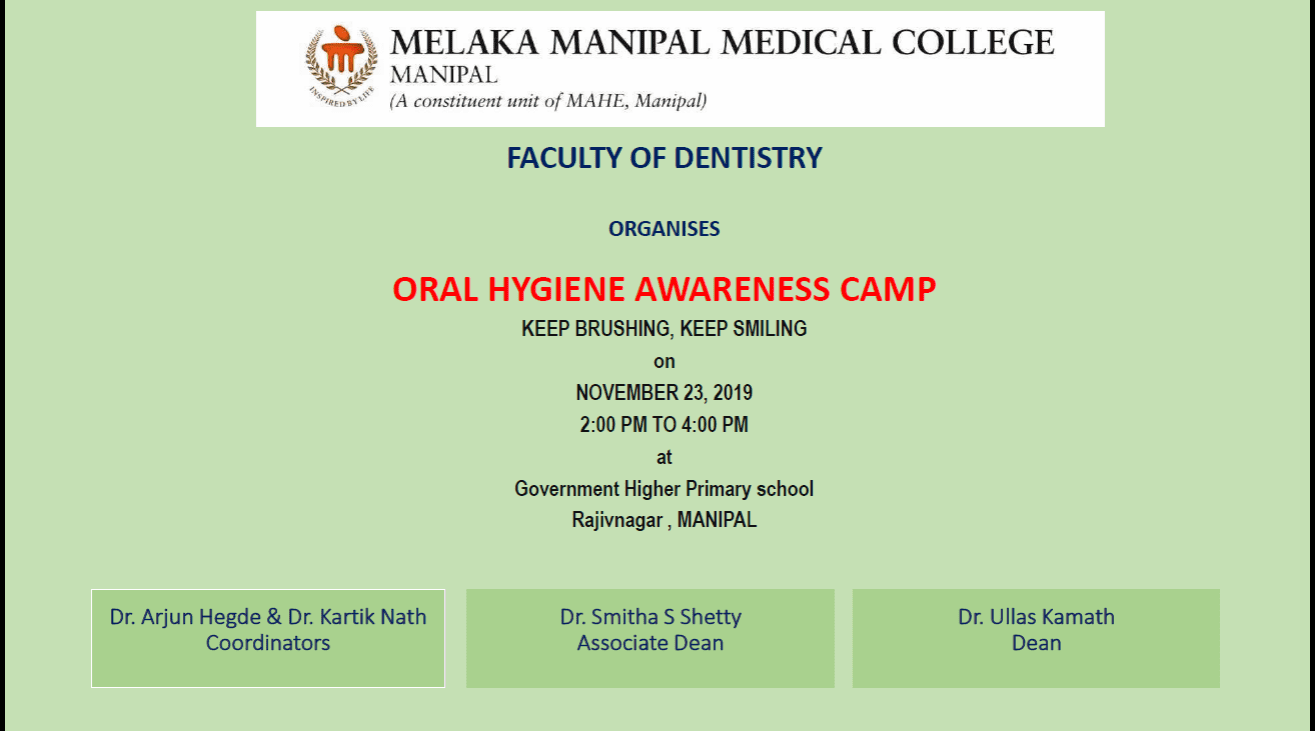
An oral hygiene awareness camp will be conducted by the Faculty of Dentistry, Melaka Manipal Medical College, MAHE, Manipal for the benefit of students of the Government Higher Primary School, Rajivnagar, Manipal. The motto for this camp is “Keep brushing, Keep Smiling”, and it will be held on Saturday, 23rd November 2019 between 2 and 4 pm.
Halitosis
Oral malodor, also known as halitosis and commonly referred to as bad breath, is an embarrassing odour. Often, people suffering from halitosis may not even be aware of their problem. A primary source for oral malodor is the tongue, home to bacteria stored inside all of its grooves and cracks. If food isn’t completely removed from the oral cavity, it tends to act as a good base for the bacteria to grow, especially on the tongue and around the gums. These bacteria digest the food and protein material in the mouth, as well as their byproducts. A possible result—bad breath.
The foods you eat affect how your breath smells because what you eat affects the air you exhale. After being absorbed into the bloodstream, some of the components of foods are transferred into the lungs, where they’re expelled when you breathe. Ingredients such as garlic, for example, contribute to bad breath odour. The objectionable odours may linger until your body naturally eliminates those foods’ components. There are other reasons why oral malodor can occur. Chronic dry mouth can cause oral malodor because saliva is necessary to clean the mouth and remove particles that may cause bad breath. Bad breath may also be caused by a medical condition, such as respiratory infections, diabetes, or gastrointestinal disturbance.
It’s Not Just You
Oral malodour can happen to anyone, so keep in mind the various things you can do—or avoid—to prevent bad breath. What is going on in your mouth and what actions you take can affect your breath.
Odour Causing Offenders
- Poor oral hygiene
- Periodontal disease
- Tongue coating
- Food impaction
- Unclean dentures
- Faulty crowns, bridges, and fillings
- Tobacco
- Medications (several drugs produce dry mouth as aside effect)
- Diet
- Systemic illness, including gastrointestinal disorders
Odour Causing defenders
- Make and keep routine dental appointments for cleaning and check-ups.
- Follow your dental professional’s instructions for daily brushing, flossing, and rinsing.
- Use an antibacterial toothpaste.
- Take special care of any dental restorations, appliances, or prosthetics.
- Consult your dentist or hygienist if you experience dry mouth.
- Take good care of your overall health
Your Dental Professional Can Help
Regular oral hygiene cleanings can keep your mouth as fresh and clean as possible. Remember to make—and keep—regular appointments with your dentist and dental hygienist.
Having your teeth professionally cleaned on a regular basis may significantly reduce halitosis. The dentist and hygienist remove deposits on teeth above and below the gum line that harbour bacteria, and also may advise you about diet to help control bad breath. If your dentist determines that the cause of your bad breath is gum disease, you may need specialized periodontal cleaning to remove the odour-causing bacteria and plaque. If after a routine examination and cleaning, you still experience bad breath—even though your mouth is considered healthy—the cause may be a medical disorder. In such instances, your dentist may refer you to your primary care physician to determine if the cause is from a medical problem.
If Bad Breath Happens to You Here’s What You Can Do
Thoroughly brush your teeth. Make sure you brush at least twice a day—soon after waking and right before you go to sleep. Using baking soda toothpaste can reduce the sulfur compounds in your mouth and help reduce bad breath. When brushing your teeth, make sure you gently brush your tongue as well; brushing your tongue releases tiny particles that cling to the tongue’s surface. Flossing is another way to rid your mouth of small food particles. Make sure you floss at least twice a day in conjunction with brushing; flossing after every meal can help reduce the presence of odour-causing residue.
Morning Breath?
Oral malodor (bad breath) is most intense when your mouth goes through a long period of reduced salivary flow and an absence of food and water. This means your breath is usually at its worst in the morning. Morning breath, as it is commonly referred to, doesn’t always mean that you have a chronic oral malodor or halitosis problem. As your body runs out of carbohydrate food sources during the night, it breaks down proteins, a process that contributes to the growth of bacteria in the mouth. The breakdown of protein and growth of bacteria cause morning breath. Most of the time, morning breath will disappear after breakfast and thorough toothbrushing, flossing, and tongue brushing or scraping.
WHAT FOODS AND DRINKS CAUSE BAD BREATH?
- Protein-rich foods
- Alcoholic beverages
- Acidic foods
- Cookies, candy
- Coffee and tea
6 Simple Steps to Sweet Breath Sensations
- Use over-the-counter mouthwashes.
- Use an antibacterial toothpaste.
- Eat sensibly.
- Drink plenty of liquids.
- Reduce stress levels.
- Chew sugar-free gum and/or use sugar-free mints.

Be the first to comment